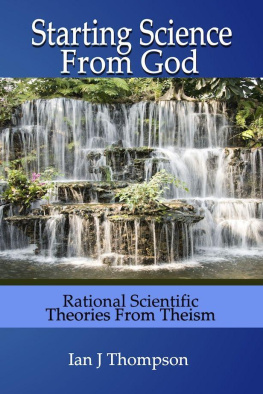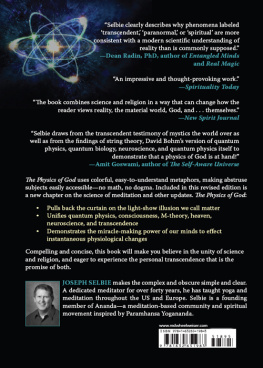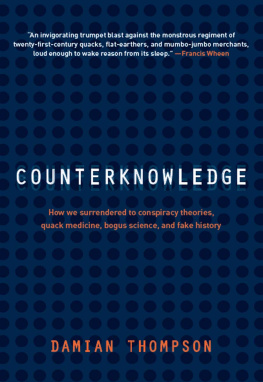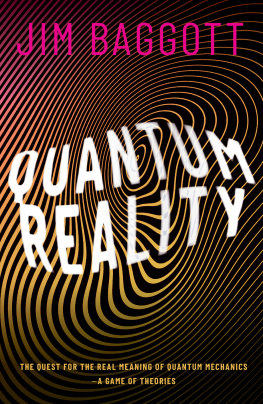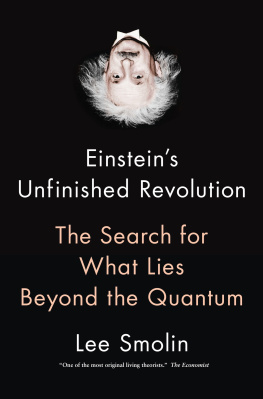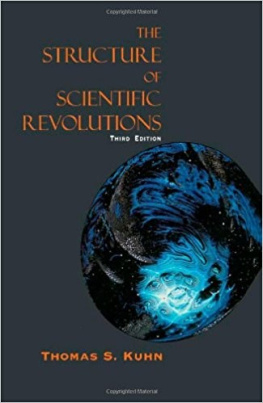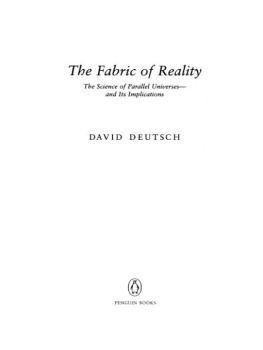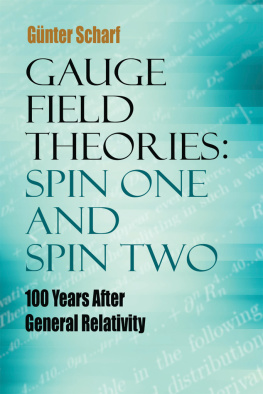Starting Science From God
Ian J. Thompson
EAGLE PEARL PRESS
Pleasanton, California
Theistic Science Series
Eagle Pearl Press
PO Box 250, Pleasanton, California 94566, USA
www.eaglepearlpress.com
Information on this title: www.eaglepearlpress.com/ssfg
I. Thompson 2011
www.ianthompson.org
Please send comments and discussion to the author at ijt@ianthompson.org
This publication is in copyright. Subject to statutory exception, no reproduction of any part may take place without the written permission of Eagle Pearl Press.
Cover photo courtesy PhotoXpress.com
Layout with L A TEX2e
Typeset November 9, 2011, v3a/25
| Publishers Cataloging-in-Publication |
| Thompson, Ian J. |
| Starting science from God / Ian J. Thompson. |
| p. cm. |
| Includes bibliographical references and index. |
| LCCN 2011942981 |
| ISBN-13: 9780984822805 (pbk.) |
| ISBN-10: 0984822801 (pbk.) |
| ISBN-13: 9780984822812 (epub.) |
| 1. Philosophy and science. 2. Religion and science. |
| 3. Theism-Philosophy. I. Title. |
| B67.T46 2011 501 |
| QBI11-600220 |
Disclaimer:
Dr Thompson is currently employed as a theoretical nuclear physicist at the Lawrence Livermore National Laboratory, California, and is Visiting Professor at the Department of Physics, University of Surrey, England, where he was Professor until 2006. This book is not supported or authorized by any of the organizations or institutions at which he is employed and/or with which he is affiliated, and does not represent any position or policy of those institutions.
Contents
Preface
I believe in God. I am a nuclear physicist. Those two things do not conflict in my mind, but instead they enhance each other.
Most of us have some idea about God and about how there might be such a being rather different from those we see every day. The concept of God has varied widely among religions over centuries, and it still varies among religions today. I subscribe to theism, in which God is seen as having created and as now sustaining the world. In the Judeo-Christian-Islamic traditionthe religions of the bookthis God is an eternal, omnipotent and benevolent being who transcends the temporality and limits of the world, but who still seeks a relation with the persons within it.
Theism has been continually supported by the religious traditions, and it was often used as a reference point in discussions between religions and the sciences. The early scientists such as Newton and Leibniz started from theistic frameworks, but science now presents purely naturalistic explanations that make no reference to God. Science now does not even assume any dualist distinctions between mind and nature.
The intellectual support for theism has thus been crumbling over the last two centuries. It is under a concerted attack today from many quarters. Newton and Leibniz thought that further scientific developments would support theism, but in fact many later scientists have turned actively against it. Sam concludes that any explanation of nature that appeals to supernatural causes is invoking causes that are inherently mysterious, immune from disconfirmation, and that give no grounds for judgment in specific cases. Without the binding assumption of uninterruptible natural law, he claims, there would be absolute chaos in the scientific worldview. These are the challenges to be addressed in this book.
Outside of theology, theistic beliefs are typically professed, if at all, only in private or only on Sundays. Dualist or non-materialist understandings of the nature of mind are not valued. In most academic and intellectual activities, there is no public discussion of theism. Cosmology and evolution theories are formed without theistic considerations. Little public mention of dualism is allowed in biology or neuropsychology.
There is a place, therefore, for a robust statement of the foundations of theism in which logical and clear connections can be made with the sciences. That is my goal. I use the framework of a realist ontology where only things with causal effects are taken as really existing. Such an ontological approach follows the path started by Aristotle and further explored by Aquinas. Existing things constitute substances, and thus mere Platonic forms, idealistic consciousness, mathematics or information are not claimed to be that out of which things are made.
Scientists have various religious beliefs. Many scientists are happy with the great simplification of the world that can be achieved once non-physical things are excluded, whereas many others have feelings or intuitions that there is more to the world than the purely physical. One result of this tension has been the progressive simplification of religious beliefs, especially concerning their ontological claims, in order to shoehorn them into the restricted framework apparently allowed by science. I hope that this book will allow many of these simplifications to be reversed.
Starting science from God is a reasonable way to proceed.
Acknowledgements
Many discussions with Jim Lawrence and Leon James over the years have kept me focused on these issues and encouraged me to get it all together in one book.
I would like to thank very much the people who have helped me in the writing of this book and who have read and commented on earlier versions: Irene Alexander, Jim Beattie, Jeremiah Bodnar, Leon James, Jim Lawrence, Mark Oldaker, Tom ONeill, Robert Selvendran, Susan Sup, Ed Sylvia, and Marilyn Woolford. We may perhaps not all agree with this final version, but being on the way with them has been endlessly instructive and enlightening.
I acknowledge again that this book is not supported or authorized by any of the organizations or institutions at which I am employed or with which I am affiliated, and does not represent any position or policy of those institutions.
I. Preliminaries
1. Introduction
1.1 Theistic postulates
In this book, I will formulate a theistic manifesto that makes explicit the foundational postulates of a scientific theism. On this basis, I will then show how deductions from these postulates give rise to the regularities of the physical world and how they generate psychological and physical structures and processes that can be confirmed from what science already has discovered. The essential theistic postulates are:
- God is love which is unselfish and cannot love only itself.
- God is wisdom as well as love and thereby also power and action.
- God is life itself: the source of all dispositions to will, think and act.
- Everything in the world is a kind of image of God: minds and also natural objects.
- The dispositions of an object are those derivatives of divine power that accord with what is actual about that object.
On the basis of such postulates, I claim that we can understand how the world appears to function with considerable regularity in its underlying principles. It is from these principles that everything has its nature. There are laws which describe how these natures operate.
In a 2011 article at Salon.com, MIT physicist Alan Lightman recognizes what he calls the Central Doctrine of science, that All properties and events in the physical universe are governed by laws, and those laws are true at every time and place in the universe. Theists do agree with that. However, in theism, the laws themselves are not physical. Lightman later refers to physical laws, but he had not mentioned that qualification to start with. He only inserted it without argument. This question, of the physical nature of laws, illuminates the difference between the existing sciences and what I show is possible for science within theism.
Next page
